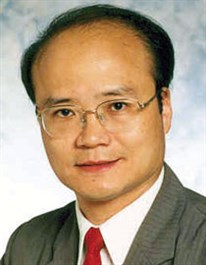


Three professors in the Department of Electrical and Computer Engineering at Texas A&M University were named Fellows of the Institute of Electrical and Electronic Engineers (IEEE). Dr. Jiang Hu (left), Dr. Peng Li (center) and Dr. Xi Zhang (right) were named IEEE Fellows for their research contributions.
IEEE Fellow is the highest grade of membership and is recognized by the technical community as a prestigious honor and an important career achievement. The IEEE grade of Fellow is conferred by the IEEE board of directors upon a person with an outstanding record of accomplishments in any of the IEEE fields of interest. The total number selected in any one year cannot exceed one-tenth of one percent of the total voting membership.
Hu was elected for contributions to gate, interconnect and clock network optimization in VLSI circuits, Li was elected for contributions to the analysis and modeling of integrated circuits and systems and Zhang was elected for his contributions to quality of service (QoS) in mobile wireless networks.
Dr. Jiang Hu
Digital VLSI chips, such as microprocessors and video decoders, are mostly composed by logic gates, which are connected by interconnect wires and synchronized by clock networks. Hu’s research accomplishments encompass all these three key elements. For gate optimizations he is a main contributor to the state-of-the-art solutions that address industrial challenges in nanometer VLSI technologies, including competing design objectives, complex models, non-ideal effects and huge problem sizes. Interconnect is a critical bottleneck to digital chip performance.
On interconnect optimization, Hu has produced large impact in both academia and industry. His research results have been applied on many industrial chip products, facilitating better chip performance, less chip power, shorter design turn-around time and solving difficult design cases. Hu is also highly recognized for his research on VLSI clock network optimization. Among many contributions, he pioneered the concept of cross-link, which greatly enhances clock network robustness with very high energy-efficiency, and inspired numerous follow-up research activities. Hu’s overall achievement is instrumental in shaping the course of VLSI optimization research and helping the VLSI industry tackle real world challenges.
Dr. Peng Li
Li obtained his Ph. D. in electrical and computer engineering from Carnegie Mellon University and joined the department in 2004. He has established expertise in electronic design automation, integrated circuits and systems, brain-inspired computing and aspects of computational neuroscience. In addition to his elevation to IEEE Fellow, his work has been recognized by various distinctions including four best paper awards from prestigious VLSI and EDA conferences, an NSF Career Award, four Inventor Recognition Awards from the Microelectronics Advanced Research Corporation and the Semiconductor Research Corporation. Li received the Best Paper Hat Trick Award, Prolific Author Award and Top 10 Author in Fifth Decade Award, all from the IEEE/ACM Design Automation Conference, the world’s premier VLSI technology conference.
Li’s former associates have obtained faculty and research positions in academia and industrial labs (Michigan Tech, Cornell Medical College/Cornell University, Intel Strategic CAD Laboratories) and research and development positions in the United States high-tech industry. He has brought his work to the real world through technology transfer and consulting for major semiconductor firms and startups.
Dr. Xi Zhang
Zhang, founding director of the Networking and Information Systems Laboratory, joined the department in 2002 upon receiving his Ph.D. degree in electrical engineering and computer science (electrical engineering – systems) from The University of Michigan, Ann Arbor. He was a research fellow with the School of Electrical Engineering, University of Technology, Sydney, Australia, and the Department of Electrical and Computer Engineering, James Cook University, Australia. He was also with the Networks and Distributed Systems Research Department, AT&T Bell Laboratories, Murray Hill, New Jersey and AT&T Laboratories Research, Florham Park, New Jersey.
Zhang has published more than 300 research papers, two books and multiple book chapters in mobile wireless networks, statistical delay-bounded QoS guarantee for multimedia wireless networks, 5G mobile wireless networks, wireless cognitive radio networks, wireless sensor networks, underwater wireless networks, network protocol design and modeling, statistical communications, random signal processing, information theory and control theory and systems. His publications have been extensively cited in the research communities.
He received the U.S. National Science Foundation CAREER Award in 2004 for his research in the areas of mobile wireless and multicast networking and systems. He is an IEEE distinguished lecturer for both the IEEE Communications Society and IEEE Vehicular Technology Society. He received Best Paper Awards at IEEE GLOBECOM 2014, IEEE GLOBECOM 2009, IEEE GLOBECOM 2007 and IEEE WCNC 2010, respectively. Zhang is author of an IEEE BEST READINGS (receiving the top citation rate) journal paper. He also received a TEES Select Young Faculty Award for Excellence in Research Performance from the Dwight Look College of Engineering at Texas A&M in 2006.
He is serving or has been editor for numerous IEEE Transactions and Journals, including IEEE Transactions on Communications, IEEE Transactions on Wireless Communications, IEEE Transactions on Vehicular Technology, IEEE Journal on Selected Areas in Communications, IEEE Communications Letters, IEEE Communications Magazine and IEEE Wireless Communications Magazine. He has served as the technical program (TPC) chair for IEEE GLOBECOM 2011, TPC vice-chair for IEEE INFOCOM 2010, TPC area chair for IEEE INFOCOM 2012, panel/demo/poster chair for ACM MobiCom 2011 and general chair for IEEE WCNC 2013, etc.